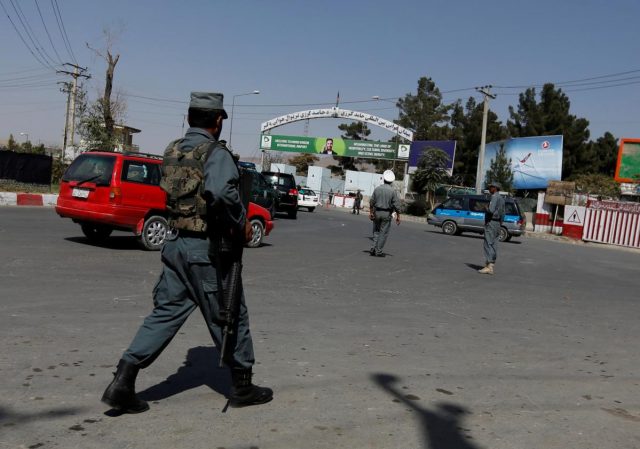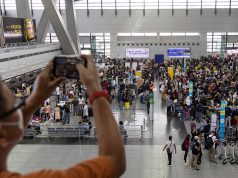
KABUL — Suicide bombers and militants firing mortars attacked Kabul’s airport during a visit by U.S. Defense Secretary Jim Mattis on Wednesday, prompting a U.S. air strike that accidentally killed civilians, officials said.
The clashes and casualties overshadowed a visit intended to demonstrate U.S. support for the Afghan government and provided a sharp reminder of the risks associated with a more aggressive U.S. policy that is expected to increase the number of air strikes.
Hours after Mattis touched down in Kabul, militants fired high explosive ammunition including mortar rounds near the main airport and detonated several suicide vests in an attack claimed by both the Taliban and Islamic State.
Gunmen holed up in a nearby house battled security forces for much of the day.
U.S. forces conducted an air strike supporting an Afghan special police unit fighting the attackers but suffered a “missile malfunction”, causing several casualties, the U.S.-led NATO mission there said. It gave no further details.
“Resolute Support deeply regrets the harm to non-combatants,” the statement said. “We take every precaution to avoid civilian casualties, even as the enemies of Afghanistan continue to operate in locations that deliberately put civilians at very high risk.”
Mattis’ visit came after U.S. President Donald Trump announced a new strategy for Afghanistan, promising a stepped-up military campaign against the Taliban who have gained ground as they seek to re-establish their brand of Islamic law after their 2001 defeat.
The strategy will give U.S. commanders greater freedom to use American firepower against the militants but, speaking a few hours before the air strike, Mattis said they would do “everything humanly possible” to prevent civilian casualties.
“We are here to protect the Afghan people while we attack the terrorists,” he told a joint news conference with Ghani and NATO Secretary General Jens Stoltenberg, accusing militants of hiding behind women and children.
Negotiated settlement
Mattis said the Taliban could not hope for a military victory and promised a more “holistic” approach without fixed timetables and involving other countries in the region, including Pakistan. “I want to reinforce to the Taliban that the only path to peace and political legitimacy for them is through a negotiated settlement,” he said.
Ghani said his government “remains open to talks with the Taliban” as well as a peace strategy involving Pakistan.
Mattis has said the United States will send an additional 3,000 troops to help train Afghan security forces, which are focusing on building up the air force and special forces, but he gave few details of what would change.
“I don’t want to tell the enemy exactly what we are doing but the whole point is to make certain we have a compelling battlefield advantage over anything the Taliban tries to mass against your forces,” he said.
The Taliban have made steady inroads since NATO ended its main combat operation in 2014 and are now estimated to control or contest at least 40 percent of the country. Afghan commanders have regularly pleaded for more air support.
However the Kabul air strike showed the risks that the new strategy could cause a repeat of the bitter disputes over civilian casualties that soured relations between Washington and the government of former President Hamid Karzai.
Already in the first half of the year, as Afghan and U.S. aerial operations have picked up, U.N. figures have shown a 43-percent jump in civilian casualties caused by air strikes and Ghani called on his allies to limit the damage.
There are now about 8,400 U.S. troops in Afghanistan as part of the 13,500-strong NATO-led Resolute Support mission advising and training Afghan forces as well as a separate counter-terrorism mission, targeting Islamic State and al Qaeda.
Trump has said he expects NATO allies to increase contributions of both troops and funding to the Afghanistan mission, and Stoltenberg said the credibility of the international alliance depended on maintaining support.
“We know the cost of staying in Afghanistan,” he said. “But the cost of leaving would be higher. If NATO forces leave too soon, there is a risk Afghanistan may return to a state of chaos and once again become a safe haven for international terrorism.”









